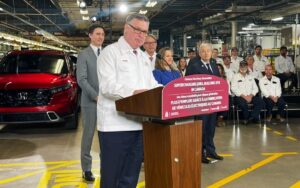Canada’s largest single EV supply chain announcement will see EV production start in 2028, with battery-making facilities developed in tandem

Jean Marc Leclerc, Honda Canada president and CEO, announcing Honda’s four-factory EV and battery manufacturing package, the largest single EV industry investment in Canada. Also shown (left to right): Prime Minister Justin Trudeau, Honda Motor Co. president and CEO Toshihiro Mibe, Finance Minister Chrystia Freeland and Minister of Innovation, Science and Industry François-Philippe Champagne. Photo: Electric Autonomy
Canada’s largest single EV supply chain announcement will see EV production start in 2028, with battery-making facilities developed in tandem
Honda is building a series of four factories in Ontario as part of a massive $15-billion investment in its North American EV manufacturing footprint.
The announcement, held at the automaker’s existing auto assembly plant in Alliston, Ont., comes after a week of frenzied speculation that the Japanese automaker was on the cusp of revealing its long-rumoured commitment to manufacturing EVs in Ontario.
It turns out to be the case. But there is a bonus: Honda is exploring setting up two factories with two joint venture partners in South Korea’s Posco Chemicals and Japanese chemicals company Asahi Kasei.
Billing the investment as a plan “to establish [a] comprehensive electric vehicle value chain in Ontario,” Honda says the move complements ongoing development of its EV Hub project in Ohio and “will represent a significant aspect of the company’s overall value chain in North America.”
In a prepared statement, Honda Canada president and CEO Jean Marc Leclerc said the “historic” investment builds on Honda’s multi-decade track record of automotive manufacturing in Canada.
Honda’s commitment
While there has been a long list of EV and battery supply chain commitments made in Canada since 2020, Honda’s investment surpasses all previous competitor projects in both cost and scale.
Specifically, Honda’s EV factory footprint in Ontario will comprise of four parts:
- An EV manufacturing plant in Alliston that will begin production in 2028 and, when fully operational, will be able to turn out 240,000 EVs per year;
- A battery manufacturing plant in Alliston to produce 36 GW of batteries per year;
- A cathode active material (CAM) and precursor cathode active material (pCAM) factory in a joint venture with Posco Chemicals at an unannounced location in Ontario; and
- A separator factory in a joint venture with Asahi Kasei at an unannounced location in Ontario.
Speaking exclusively with Electric Autonomy after the official ceremonies, Leclerc said it is too early to say what EVs will be made at the new plant. However, he then added that these would be vehicles that “Canadians want” and would include an “affordable SUV.”
On the battery side, the new plant will begin by making lithium ion batteries, but there are plans in place to transition later to solid state technology. Leclerc also said that Honda would be leveraging the latest battery chemistry technology it is developing in Japan.
Federal and provincial support
In total, the four-part investment carries a $15-billion price tag that will create at least 1,000 new jobs. Honda is eligible to receive up to $5 billion in incentives and subsidies, divided equally between the provincial and federal governments.
The federal portion will come chiefly through the new EV Supply Chain Investment Tax Credit introduced in this month’s budget as well as the proposed Clean Technology Manufacturing Investment Tax Credit.
Ontario’s $2.5-billion contribution will come from a mix of direct and indirect incentives.
Dignitaries joining Leclerc for the announcement included Honda’s Global CEO Toshihiro Mibe, Prime Minister Justin Trudeau along with several of his senior ministers, Ontario Premier Doug Ford and Vic Fedeli, Minister of Economic Development, Job Creation and Trade.
Speaking to Electric Autonomy, Fedeli confirmed that the deal was two years in the making. He says it was over a family-style meeting at Premier Doug Ford’s Etobicoke, Ont., home that the agreement was finalized.
Electric Autonomy will continue to update this story as more details about the investment emerge.






